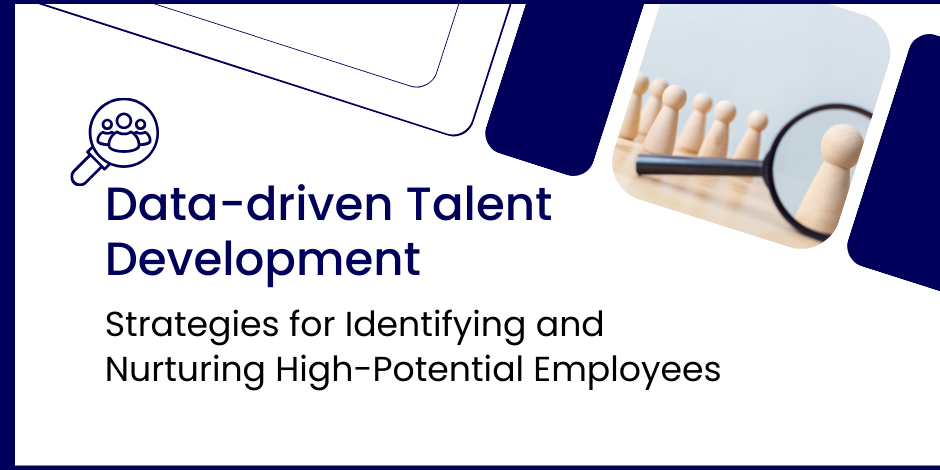Data-driven Talent Development: Strategies for Identifying and Nurturing High-Potential Employees

Stay Informed With Our Weekly Newsletter
Receive crucial updates on the ever-evolving landscape of technology and innovation.
Data-driven talent development is a crucial aspect of any organisation’s success. By harnessing the power of data, businesses can identify and nurture high-potential employees, resulting in a highly skilled and motivated workforce.
Understanding the concept of data-driven talent development

Data-driven talent development is an approach that relies on data analysis to make decisions about employee development. Organisations can gain valuable insights into their workforce by collecting and analysing relevant data, such as performance metrics, skills assessments, and employee feedback.
Regarding talent development, data plays a crucial role in shaping strategies and initiatives. It provides objective information that eliminates bias and allows organisations to identify skill gaps, track employee progress, and make data-driven decisions to improve individual and organisational performance.
The importance of data in talent development
Data-driven talent development is not just a buzzword but a fundamental aspect of modern human resources practices. Using data in talent development has revolutionised how organisations approach employee growth and development.
By leveraging data, organisations can better understand their employees’ strengths and weaknesses. This knowledge enables them to tailor development plans that address specific skill gaps and maximise individual potential.
Moreover, data-driven talent development helps organisations identify high-potential employees for leadership positions.
Another significant advantage is to provide objective performance evaluations. Traditional performance appraisals often suffer from subjectivity and bias.
However, by relying on data, organisations can ensure fair and accurate assessments, leading to more effective talent development strategies.
Key principles of data-driven talent development
Implementing data-driven strategies requires adherence to several fundamental principles:
- Align initiatives with organisational goals: It is essential to ensure that talent development efforts align with the organisation’s overall objectives. This alignment ensures that development activities contribute to the organisation’s success.
- Collect and analyse relevant data regularly: Organisations must collect and analyse data regularly to make informed decisions. This includes performance metrics, skills assessments, and employee feedback. Regular data collection ensures that talent development strategies are based on up-to-date and accurate information.
- Use data to identify high-potential employees and personalise development plans: Data analysis can help identify employees with high potential. By recognising these individuals, organisations can create personalised development plans that nurture their talents and accelerate their growth.
- Continuously evaluate the effectiveness of talent development programs: Data-driven talent development is an iterative process. Organisations must constantly assess the effectiveness of their programs and make adjustments as needed. This evaluation ensures that talent development efforts remain relevant and impactful.
- Ensure data privacy and data security: As organisations collect and analyse employee data, it is crucial to prioritise data privacy and security. Safeguarding employee information protects their rights and builds trust and confidence in the talent development process.
By following these principles, organisations can harness the power of data to unlock the full potential of their workforce. It is an approach that empowers employees, enhances organisational performance, and drives sustainable growth.
Identifying high-potential employees through data

Identifying high-potential employees is crucial for effective talent development. Data analysis helps organisations identify individuals who demonstrate exceptional abilities and have the potential to take on leadership roles in the future.
Defining high-potential employees
High-potential employees, often called “HIPOs,” possess the right combination of skills, traits, and potential to excel in higher-level roles within the organisation. They desire to learn and grow, demonstrate leadership capabilities, and consistently achieve outstanding results.
The role of data in identifying high-potential talent
Data provides valuable insights into employee performance, potential, and career aspirations. Organisations can identify patterns and trends that indicate high-potential employees by analysing data. This includes exceptional performance, upward mobility, and a willingness to take on challenging assignments.
Nurturing high-potential employees using data-driven strategies
Nurturing high-potential employees is crucial to retaining top talent and maximising their organisational contributions. Data-driven strategies can help organisations create personalised development plans that meet high-potential individuals’ unique needs and aspirations.
The significance of nurturing high-potential employees
Nurturing high-potential employees helps them fulfil their potential and benefits the organisation. By investing in their development, organisations create a pipeline of future leaders, foster a culture of continuous learning, and improve overall performance and innovation.
Data-driven strategies for nurturing talent
There are several data-driven strategies organisations can employ to nurture high-potential employees:
- Create individualised development plans based on data insights.
- Provide targeted training and coaching to address skill gaps.
- Offer stretch assignments and challenging projects to promote growth.
- Establish mentoring programs to provide guidance and support.
- Regularly evaluate and adjust development plans based on data feedback.
Implementing data strategy in your organisation
Implementing a data-driven strategy requires a systematic and well-planned approach. By following these steps, organisations can effectively integrate data into their talent development initiatives.
Steps to implement a data-driven strategy
- Define clear objectives: Identify the goals and objectives of your talent development strategy, aligning them with the overall business strategy.
- Identify relevant data sources: Determine the data types needed to inform talent development decisions, such as performance data, skills assessments, and feedback.
- Collect and analyse data: Implement processes regularly to collect and analyse relevant data, ensuring data accuracy and quality.
- Use data insights to inform decisions: Leverage data to identify high-potential employees, personalise development plans, and make informed decisions about talent development initiatives.
- Implement development programs: Design and implement programs that align with high-potential employees’ identified needs and aspirations.
- Monitor and evaluate effectiveness: Continuously evaluate the effectiveness of talent development programs through data analysis and make adjustments as needed.
Overcoming challenges in data-driven talent development
Implementing a data-driven strategy may come with its challenges. Some common challenges include data privacy concerns, data quality issues, and resistance to change.
However, organisations can overcome these challenges by establishing robust data governance frameworks, investing in data management systems, and promoting a culture of data-driven decision-making.
Measuring the success of your data strategy

Measuring the success of a data-driven strategy is crucial to determining its effectiveness and making informed decisions for future improvements. Key performance indicators (KPIs) can help organisations gauge the impact of talent development initiatives on individual and organisational success.
Key performance indicators for talent development
Some key performance indicators organisations include:
- Employee engagement scores.
- Employee retention rates.
- Promotion rates.
- The success of high-potential employees in the organisation.
By tracking these metrics, organisations can assess the effectiveness of their talent development efforts and make data-driven decisions to drive continuous improvement.
The impact of data-driven development on organisational success
Data-driven development can significantly contribute to organisational success. By leveraging data insights, organisations can optimise their talent pool, nurture high-potential employees, and align their workforce with strategic goals. This, in turn, leads to improved performance, innovation, and a competitive edge.
Conclusion
Data-driven development is a powerful strategy to identify and nurture high-potential employees. By harnessing the power of data, organisations can make informed decisions, create personalised development plans, and drive organisational success. Implementing a data-driven strategy requires a systematic approach, overcoming challenges, and measuring success through key performance indicators.
Embracing data-driven talent development can transform your organisation and empower your workforce for future success.
Are you prepared to take your tech career to the next level? Learning about and utilising data in talent growth can help you enhance your abilities and establish yourself as a leader in the industry.
Keep up with the data revolution and stay ahead of the game. Check out the Institute of Data for insights into the tactics employed by top companies.
Our corporate training programs can help you be ready for whatever the future holds, so become the change agent your organisation needs and start harnessing the power of informed talent development today!


